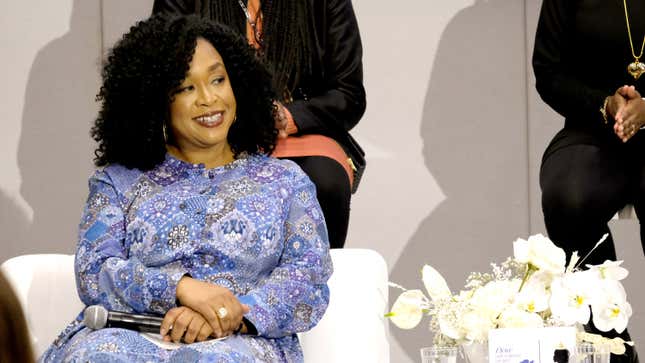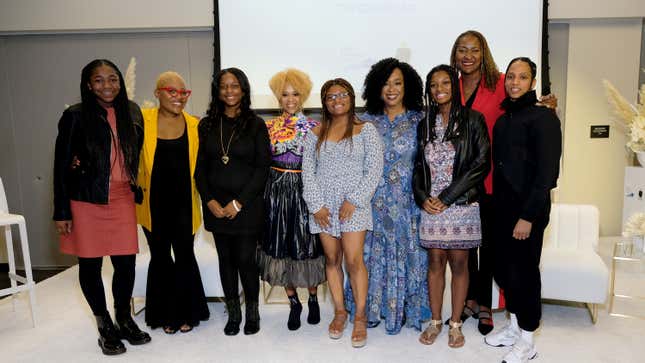
On a mild-weathered Wednesday evening, I traveled toward Downey, Calif., to visit the Los Angeles County of Education and was swept with an immense sense of pride.
As I awaited the esteemed panel to take the stage, I couldn’t help but smile at the sea of beautiful black girls coiffed in different hairstyles—braids, twists, afro puffs, cornrows, afros, bushy ponytails, sleekly straight wraps—who sat in eager anticipation, as well.
That panel was brought to us by Dove, through the CROWN (Creating a Respectful and Open World for Natural Hair) Coalition, whose “mission is to advance efforts to end hair discrimination and to create a more equitable and inclusive beauty experience for black women and girls.” For its initiative, Dove has partnered with Color Of Change, Western Center on Law and Poverty and the National Urban League.
The evening consisted of a Dove Self-Esteem Town Hall and Workshop. Shonda Rhimes (also known as the woman who currently has proprietorship of Thursday nights in primetime television), Unilever Executive Vice President and Chief Operating Officer (North America) Esi Eggleston Bracey, California State Senator Holly Mitchell (30th Senate District) and Color of Change Program Director Janaya ‘Future’ Khan joined four real students who have faced hair discrimination—Faith Fennidy, Tyrelle Davis, Deanna Cook and Mya Cook.
In addition to the young girls recounting stories of public embarrassment, punishments and every other ridiculous rule not related to their education, the interactive panel was filled with candid discussions about anti-blackness, haircare, the importance of self-worth, self-esteem and more.
“Women need to look like women look real life,” Rhimes stated firmly during the panel.

Unfortunately, I didn’t get to take part in the workshop, but the scheduling conflict was fortunate—I got to sit down with Rhimes for an intimate one-on-one chat!
As a creator, Rhimes has certainly contributed to that “realness” of a black woman’s hair. Whether it was the epic moment Viola Davis’s Annalise Keating took off her wig before bed on How To Get Away With Murder, or the unforgettable hostage photo of Kerry Washington’s natural ‘do when Olivia Pope was kidnapped on Scandal. As someone who is referred to as Dove’s Chief Storyteller, I wanted to ask Rhimes when she saw herself on television, particularly when it came to hair.
“Vanessa Huxtable was not always perfectly pressed,” Rhimes recalled, referring to The Cosby Show sibling portrayed by Tempestt Bledsoe. “It was not always well-done; sometimes it’s sticking out a little bit, [and] it felt real. And then you had the sisters who had much more perfect [hair]—Rudy had her little braids. But Vanessa felt like me.”
“That was exciting to see—watching television, that image was good—to see somebody who you related to, who looked like you,” Rhimes continued. “Over time, there have been a few of those images for girls. I don’t think that there were a ton. Now, I think that there are more. I don’t know that they’re teenage girls, but I see a lot of women who are like that. I think there are some shows coming out where you’re starting to see young women who definitely are more representative. And that’s exciting, too.”
Growing up, Rhimes never considered herself to be a “beauty product girl,” but she also coveted beloved hairstyles on media stars, especially Whitney Houston (about whom she chuckled as she recounted the time in college she found out Whitney was wearing a wig and was “devastated”). As for her own hair journey, Rhimes said she’s tried “every different hairstyle you could possibly imagine.” And as the mother of three girls, she knows the importance of young girls being affected by the images they ingest in different facets of media.
“I think it’s tough out there now,” Rhimes noted. “Kids are bombarded with images in ways that we just never were. So, there’s things that I’m not even sure I know about that are coming at our kids. I’m trying to create a world in which they’re seeing images of themselves as much as possible...women who are beautiful, in the dolls they play with, in the books they read, in the shows they can see—they don’t get to watch a lot of television, but that’s important—what comes into their house and the images that they’re allowed to see. They need to see those images and see those women and understand that that’s what beauty is, too.”
As someone who has “always been a boss,” Rhimes makes sure that sense of beauty is also reflected in her office at Shondaland. That’s right, won’t be any hair discrimination microaggressions in her world. Shondaland is a safe space.
“There are women in our office who have all kinds of hairstyles,” Rhimes beamed. “And I like that everybody feels free to wear their hair however they want and to be whoever they want in our office. It feels good to me. I did, one day, look around and think to myself, ‘I don’t think I’ve ever seen an office where this has happened.’”
As Sen. Mitchell noted, there are only two states in the U.S. (California and New York) that have deemed hair discrimination race-based and thus illegal, as it is determined to be a protected class. California’s law will go into effect in January 2020. Of course, the fight continues as administrators work to implement the illegality of hair discrimination on the federal level.
Since Wednesday’s panel was focused on actionable change, I will end by urging you to sign the petition to help pass The CROWN Act as well as download this template letter to address to your respective legislators.



